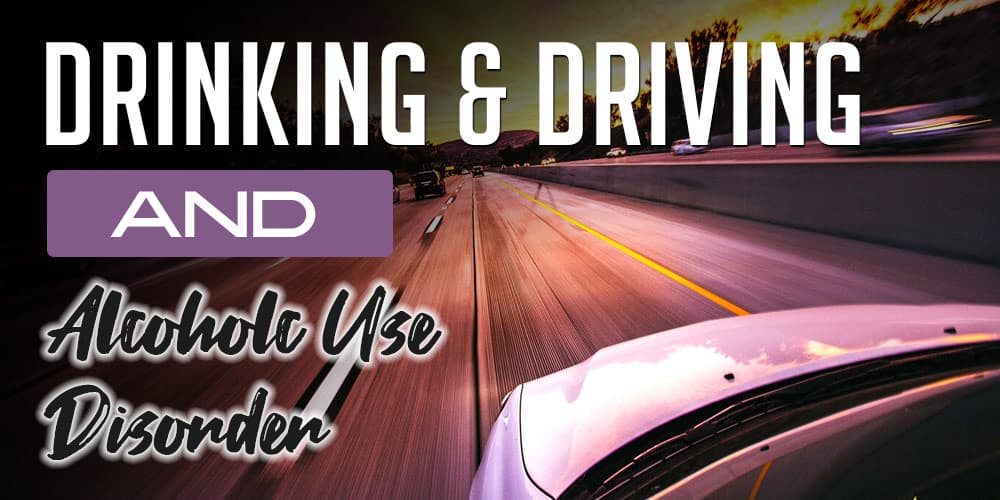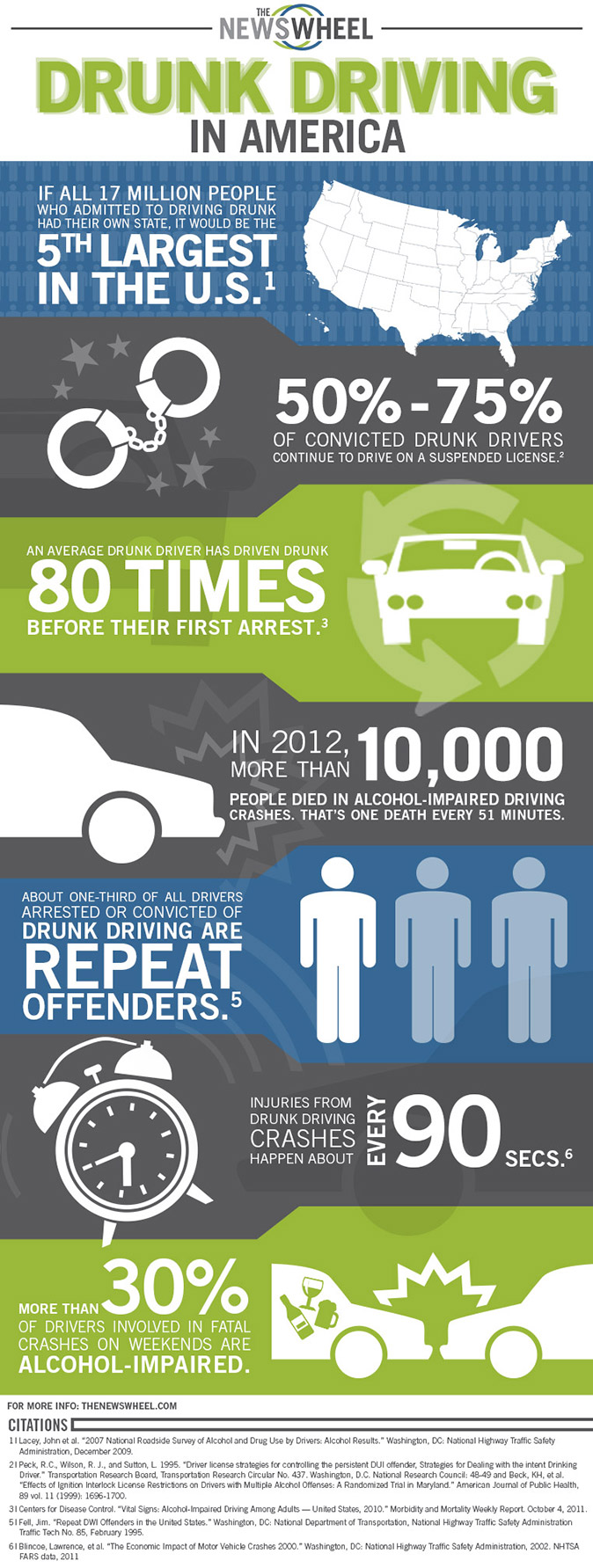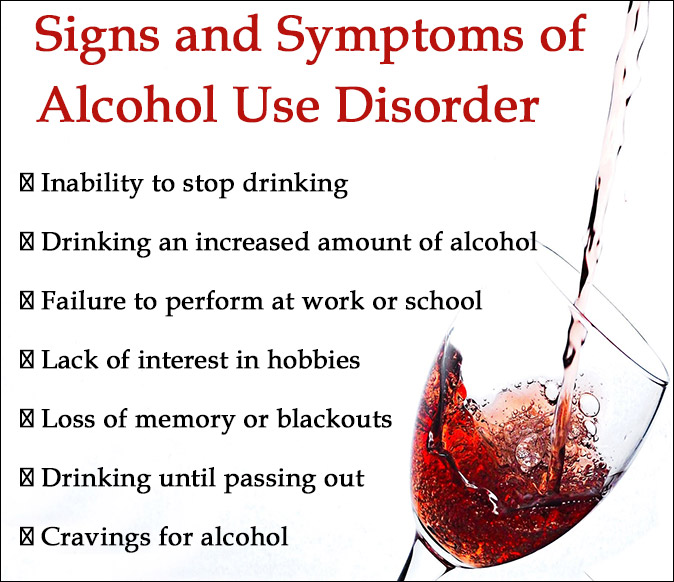
The life and safety of a loved one can be a constant fear for many family members and we often feel powerless to help them. This is especially true if a loved one is repeatedly drinking and driving while using alcohol or drugs.
Certain holidays are a notoriously dangerous time for those with a problem of driving under the influence because alcohol consumption is almost encouraged by society at these times of the year. Some of these include:
- New Year’s Eve
- Mardi Gras
- St. Patrick’s Day
- Cinco de Mayo
- Memorial Day
- 4th of July
- Labor Day
- Halloween
- Thanksgiving
- Christmas
Despite warnings and awareness campaigns, alcohol-impaired driving still kills one person every 50 minutes in the United States. According to the CDC, in 2020 alone, 11,654 people were killed due to drunk driving.
This infographic from The News Wheel shows statistics about Drunk Driving in America.

To help those who face the very common problem of drinking and driving and putting others at risk, we need to first understand what they are thinking.
Drinking and Driving Statistics
There are a several reasons why people drink and drive.
1) First, many people think that they can handle their drinking and get away with it. This sort of ego and misplaced confidence can be hard to shake.
2) The second and more important reason, is that they might completely understand it’s not okay to drink and drive. But after a few drinks when they become intoxicated they simply make bad decisions.
This is because alcohol impairs executive cognitive functioning (ECF), which is responsible for reasoning, planning, self-monitoring, and personal behavior.
In other words, even though a person knows it is not okay to drink and drive when they are sober, alcohol impairs their reasoning and judgment to the point that they no longer make rational decisions about things like driving when they are intoxicated.
Many people live with the stress of their loved one’s substance use and subsequent choices, which often times includes drunk driving.
Sadly, data from the National Highway Traffic Safety Administration (NHTSA) in 2016 shows that 3,070 of the fatalities from drunk driving were occupants of the vehicles, and another 948 were non-occupant pedestrians or by-passers.
Helping people make the right choice is essential for protecting their own welfare, and the welfare of those around them.
How to Talk With Someone One About Drinking and Driving
Thankfully, if your friend or loved one is not willing to stop drink driving, there are measures that can be taken to help ensure their safety and the lives of others on the road. If the impaired driving episodes are limited to social occasions, or if you are going to an event with them. there are clear steps that you can take.
In the first instance, take the time to sit down and have an open, honest, and nonjudgmental discussion with your loved one about their drinking and driving habits. Be aware that they might become defensive at the very idea of discussing the issue.
It’s normal for people to want to avoid or ignore the problem, rather than facing up to it. Never get angry, and instead, keep calm and connect with them in a loving way. Otherwise they might shut down and not listen.
Each person is different. Some will relate to the legal or financial consequences of drunk driving, while others will have empathy for the fact that they could be putting minors and other innocent bystanders at risk.
When speaking with to someone try to keep the conversation focused on emotional triggers with which they can relate.
It may sound crass, but if they are proud of their good looks, then perhaps the thought of a near fatal car crash destroying their appearance might be enough to make them think twice. Do whatever it takes to appeal to their sensibilities.

3 Ways To Avoid Drinking and Driving
While there are many approaches to help your loved one travel safely and avoid driving under the influence of alcohol or drugs, here are three of the most effective ways to avoid drinking and driving.
1. Use a Designated Driver
If there’s going to be alcohol at any event, it’s a good idea to have a designated driver handle transportation to and from the venue to eliminate the option of drinking and driving.
Having a sober person drive home after drinking eliminates the chance of driving under the influence. Take turns with friends or family members being the designated driver to always ensure everyone arrives home safely.
2. Arrange Alternative Transportation
You can offer to share an Uber, Lyft, cab, or some other form of public transportation before going out. Discuss what travel options your loved one prefers and make sure they stick to it. If they prefer to take a cab, offer to pay for it and give them money to cover the cost. You could also take the initiative and call the cab for them ahead of time.
Another alternative to driving home is to stay overnight if the event takes place at a friend’s house. It’s best to plan for this before taking the first drink so everyone will be able to enjoy the the day or evening.
Being prepared ahead of time will remove the necessity to drink and drive.
3. Plan Sober Events
Choosing activities that require everyone to be sober is a good way to avoid drinking driving. If you know that you’ll be entertaining a guest that has a problem with drunk driving, plan activities to participate in where everyone will be sober.
Other options to try are dry nights out, or in. Things to avoid are restaurants with big wine lists, pubs or club based activities – where alcohol is the main focus. Planning sober events is particularly useful if your loved one is stubborn and won’t discuss their drunk driving problems.
Watch Out For Alcohol Use Disorder
Drinking and driving can be a sign of a person struggling with alcohol use disorder. If this is the case it might be a good idea to discuss the wider alcohol use problem, rather than just the drinking and driving issue.

By shining a light on the problem, you can help those you care about understand that it’s okay to ask for help.
Families can be overly accepting and avoid discussing sticky issues like impaired driving or alcohol dependency. This avoidance approach can unfortunately further enable the problem, which can put your loved one and others around them in serious danger.
It is ultimately more responsible to take the time to address the issue in a loving and supportive way, no matter how difficult it can be to discuss the subject.
7 Signs and Symptoms of Alcohol Use Disorder
If you suspect that your loved one might have an alcohol use disorder, it is a good idea to check if they are showing any of the common signs of alcohol addiction, such as:
- Inability to stop drinking, despite previous attempts
- Drinking an increased amount of alcohol (to get a buzz)
- Failure to perform effectively at work or school
- Lack of interest in activities or hobbies they once enjoyed
- Loss of memory or blackouts
- Drinking until they pass out
- Cravings for alcohol when they are not drinking
Related: 10 Questions to Ask When Searching for Addiction Rehab
Don’t Be Afraid to Have a Conversation About Drinking and Driving
Driving under the influence of drugs or alcohol is a common problem that impacts the person driving under the influence as well as everyone else on the road.
However there are ways to help a loved one avoid this dangerous behavior or to get professional help if necessary. Take the time to talk to your loved one about the dangers of drinking and driving in a calm and loving manner.
If you think that your loved one might have a wider problem and may be suffering from alcohol use disorder, don’t be afraid to ask for help.
Related Posts
- Signs Of Addiction To Watch For
Addiction is a serious disease and it is imperative for it to be regarded as…
- 46 Movies About Drugs, Addiction and Alcoholism
Movies about drugs, addiction and alcoholism can be hard-hitting and even triggering for some people.…
- Alcohol Dementia Causes, Symptoms and Treatment
Note: Alcohol Dementia goes by many names including, alcohol-related dementia, alcoholic dementia, and alcohol-induced dementia.…
